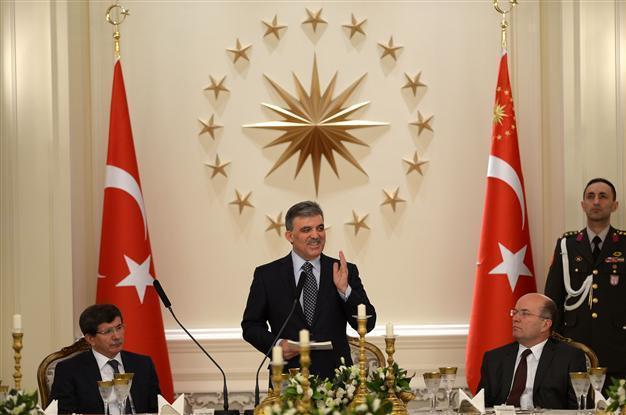Turkish president stresses national interest in foreign policy
ANKARA

President Abdullah Gül (C) speaks at the luncheon in the Ambassadors’ Conference in Ankara as FM Davutoğlu (L) and Deputy FM Koru listen.
President Abdullah Gül has stressed the need to maintain national interests as the fundamental responsibility of Turkish diplomacy, urging an avoidance of cyclical and emotional policy, in an indirect call to Foreign Minister Ahmet Davutoğlu, who is frequently criticized over his diplomatic priorities, particularly in regard to the Arab Spring.“We should calculate what [political] results we will get as Turkish people when the waves settle and fire is extinguished in the countries under transformation [as part of the Arab Spring]. Sooner or later this turmoil will end but what will remain in our hands is very important,” Gül said yesterday in his address to Turkey’s ambassadors, who gathered in Ankara. “We should not forget that our main responsibility towards our people is to protect and advance our country’s national interest. While supporting nations on the grounds of humanitarian values and brotherhood in their difficult days, we should not lose our moral superiority either. We should not let any nation or any community misread Turkey’s goodwill policy [of] embracing everyone,” he said.
Gül’s statement came a day after Davutoğlu made an assertive speech at the opening of the fifth Ambassadors’ Conference, in which he said that Turkey will be more active in shaping the flow of history. Turkey would take all risks necessary and could even make mistakes, but would not behave spinelessly, he said.
Critics of Turkey’s policies regarding the developments in its southern neighbor of Syria criticized Davutoğlu for ignoring the country’s national interests and security needs while placing emotional dimensions at the core if its policy.
China as the model
Turkey’s close historical, cultural and political links with the countries of the Mediterranean basin obligate Turkey to closely engage in the transition process of the Arab Spring countries, Gül said, but this historical fact should not be interpreted as Turkey’s imperial dreams. “Modern Turkey has never been a country that has a hidden agenda beyond its national interest.” Turkey should make farsighted plans 20, 30 or even 100 years ahead without the influence cyclical conditions and instantaneous thrills, Gül advised.
“We should realize consistent and integrated policies to help our country reach its long-term objectives. We all know that the best implementer of this sort of policy is China. It has walked on its path since 1987 to achieve its own goals.”
Turkey has its own goals of becoming an economically developed country whose democracy and rule of law has the same standard as other developed countries, he said.
“I believe developing and implementing policies without ignoring our goals has vital importance.”
















